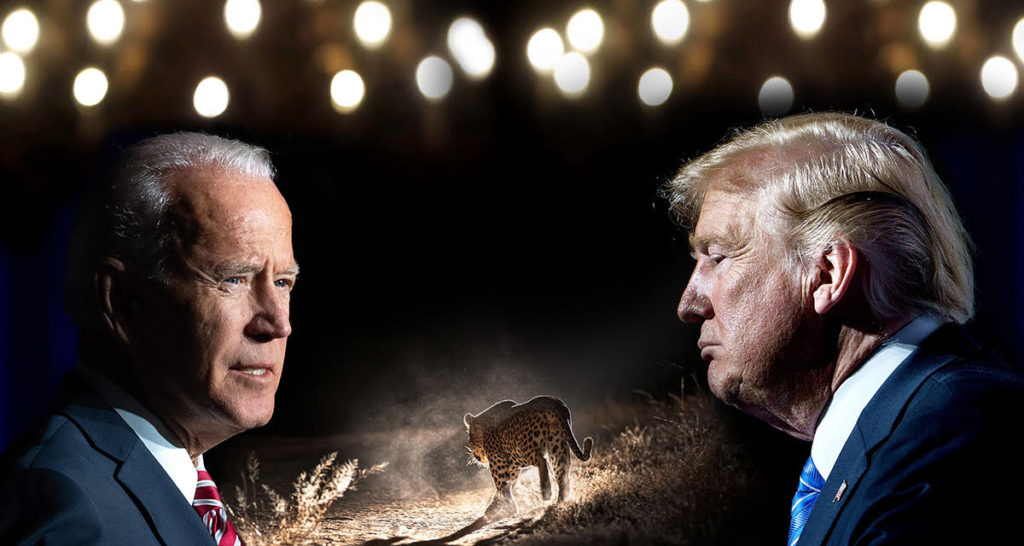The match-up is set. A first-term incumbent President who came into office in 2017 as a political newcomer squaring off against a former two-term Vice President who had previously served for more than three decades in the U.S. Senate.
In the coming weeks, we will publish detailed analyses of their records, steering clear of any partisanship by only calling balls and strikes on their performance on animal issues. On our board and our staff, we have Democrats and Republicans, but we are all committed to the principle of a single-minded focus on the treatment of animals.
If these issues are to command the attention of the two major party candidates, animal advocates must make themselves heard. Today we are launching two petitions – one addressed to Vice President Biden, the other to President Trump – urging each candidate to make animal welfare a priority concern.
Why animals matter in politics
Animal protection is perhaps the most underestimated issue in American politics. One survey indicated it is the top non-profit cause in America, as measured by the number of donors and volunteers. Yet this set of issues does not attract the attention it deserves from many national politicians. We hope to change that between now and November. You can help by urging the candidates to speak up.
Two-thirds of American homes have companion animals, and pet care is a $75 billion industry. Expenditures on wildlife watching are even greater. Opposition to malicious animal cruelty is a felony offense in every state. And there are dozens of federal laws to protect animals.
In recent years, there’s been progress in fortifying that federal legal framework against cruelty. The 2018 Farm Bill included a series of important amendments banning animal fighting in the U.S. territories, outlawing domestic trade in dog and cat meat, and strengthening legal protections for women, children, and pets in settings where domestic violence flares. And Congress unanimously passed, and President Trump signed into law, the Preventing Animal Cruelty and Torture (PACT) Act. Meanwhile, the Big Cat Public Safety Act, the Sharkfin Sales Elimination Act, the Horseracing Integrity Act, and the Prevent All Soring Tactics Act have built major bipartisan support (each with more 250 cosponsors, or near or absolute majorities of the 535 Members of Congress), though none of those measures is over the finish line yet.
Enforcing laws is as crucial as enacting them, whether it’s the USDA applying Animal Welfare Act standards, the Department of Justice making arrests for malicious cruelty, or the U.S. Fish and Wildlife Service interdicting illegal wildlife exploitation. Yet enforcement is often lax or non-existent. With a live-wildlife market in China widely recognized as the incubator of the COVID-19 pandemic, never before has there been a more compelling example of how the mistreatment of animals affects the whole of society.
The pandemic was just the latest wake-up call on that score. Since the advent of factory farming, we’ve witnessed how mass concentration of animals in warehouses has incubated antibiotic-resistant bacteria, swine, and avian flu, and delivered noxious effluent into our communities. Cockfighting, cervid ranches, and a range of other forms of animal exploitation bring their forms of peril and disease.
There’s momentum for change
Most movements are born of crisis, and that’s true for animal welfare. Our movement has been a counterweight to appalling exploitation. Chinas may finally ban the dog-meat trade and live-wildlife markets, following the United States’ passage of the Dog and Cat Meat Trade Prohibition Act that Trump signed into law in 2018. The United States ended the use of chimpanzees in invasive experiments in 2015 and the live-animal circus acts collapsed that year, too. California and Massachusetts have passed pathbreaking ballot initiatives to forbid the sale of pork, veal, and eggs from intensive confinement farms. Florida voters banned greyhound racing, shuttering two-thirds of the nation’s tracks. The Congress banned animal fighting everywhere in the U.S. starting in December 2019. Beyond Meat, a 10-year-old start-up, had one of the biggest run-ups in value of any company in the last quarter century after its Initial Public Offering. In 2019, even Tyson Foods introduced a plant-based burger and a separate offering that blends meat and plants.
Congress and the President should declare animals as “sentient beings” and adopt a broad set of policies to protect animals in agriculture, fashion, wildlife management, and other sectors of the economy. Every industry with exposure to animals can embrace alternate technologies and strategies that honor the bottom line but reduce or eliminate animal misery and pain in the process.
We ask you to read, sign, and share petitions we’ve launched to Vice President Biden and President Trump, asking for animal welfare to receive the attention it deserves. By signing these petitions (one or both), you will remind the candidates for President that American voters of all political persuasions expect them to do more for animals.
Our nation should never tolerate cruelty, even if it’s conducted by big industries. All animals deserve humane treatment. We must embrace alternatives to animal exploitation as they become available. Combating cruelty and punishing perpetrators reduces violence and builds a civil society.
